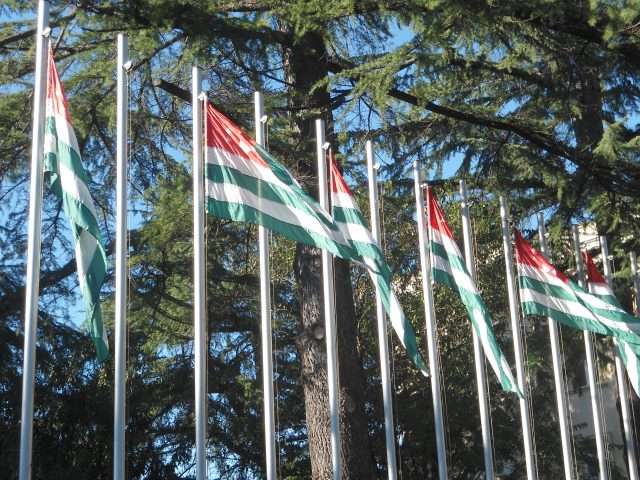Geopolitics of parliamentary elections in Abkhazia

Kavkaz Files ISSN 2975-0474 Volume 7 Issue 1
Author: Giuliano Bifolchi
The upcoming parliamentary elections in the Republic of Abkhazia are crucial for the Abkhaz political life, and regional geopolitics since the country plays a strategic role in the Caucasus and the Black Sea region.
On March 12th, 2022, parliamentary elections will occur in the Republic of Abkhazia. The Central Election Commission of the Republic of Abkhazia has registered 100 initiative groups of citizens to nominate candidates for parliament and five political parties. Currently, five political forces registered for the parliamentary elections: Partiya Ehkonomicheskogo Razvitiya Abxazii (the Party of Economic Development of Abkhazia – ERA), Narodnyj front za spravedlivost’ i razvitie (the People’s Front for Justice and Development), Amtsakhara, Narodnaya partiya Abxazii (the People’s Party of Abkhazia), Apsny.
Geopolitical scenario
The Republic of Abkhazia has a tactical role in Moscow’s strategy in the Black Sea. Thanks to its strategic position in the Caucasus on the Black Sea shores, the Republic of Abkhazia might play a logistic role connecting its main ports of Sukhum and Ochamchira with Crimea (under the Russian control after the 2014 referendum) and the ports of Ukraine, Romania, Bulgaria, and Turkey. Furthermore, thanks to Abkhazia and Moscow-Sukhum political, military, maritime, and economic cooperation, the Russian Federation might extend its naval presence in the Black Sea, creating a buffer zone from Abkhazia to Crimea, guaranteeing the control of a considerable part of the sea.
Georgia does not recognise Abkhazia independence and parliamentary elections in the country. Although an Abkhaz political culture must continue to develop, since Tbilisi considers Abkhazia as part of its sovereign territory under Moscow’s occupation, the Georgian Government does not recognise any elections in the country. Consequently, among the obstacles to an Abkhaz democratic electoral process, there is the Georgian behaviour to contrast any votation in the republic of Abkhazia. Tbilisi’s behaviour has generated mistrust among the Abkhaz people. Indeed, on the one hand, Georgia has accused the Abkhaz people of preferring to live in an occupied territory thanks to the Russian military support. On the other hand, the Georgian authorities have also criticised any Abkhaz attempt to exercise their sovereignty through elections.
Why does it matter?
Russia and Turkey are hugely interested in Abkhaz domestic politics due to their investments and geopolitical strategies. Since the 2008 Russian-Georgian War, the Republic of Abkhazia has been independent thanks to the Kremlin’s diplomatic, military, political and economic support.
Abkhazia is part of the Russian lebensraum (vital space) in the Caucasus and a vital asset in Moscow’s maritime and naval presence in the Black Sea. In this regard, the Russian Federation is the first commercial partner of the Republic of Abkhazia (81% of Abkhaz imports and 62 % of Abkhaz exports are with Russia), and Moscow needs internal stability to guarantee its investments in the country and commercial trade.
Turkey is also highly involved in the Abkhaz economy, being Ankara the second commercial partner for Sukhum (5% of the Abkhaz imports and 38% of Abkhaz exports are with Turkey) considering the central role that the entire Caucasus has in Ankara’s foreign policy. Undeniably, the 2020 Nagorno-Karabakh Conflict highlighted the Turkish role in the Caucasian regional dynamics and Ankara’s attempt to become an influential key actor in the region contrasting the Russian Federation.
Since Turkey is a NATO member and hosts U.S. military personnel on its territories, the Russian Federation needs to decrease Ankara’s role in the Caucasus. Therefore, the Republic of Abkhazia might be one of the Kremlin’s strongholds to protect from Turkish economic and political influence.
Georgia might use the parliamentary elections in Abkhazia to revitalise the Russian-Georgian confrontation and hide domestic problems. Undeniably, since the first election in 2012, the Georgian Dream has faced several internal problems related to Georgians’ disappointment over domestic corruption and the slow-economic development. In addition, the Georgian Dream has not changed the situation over Abkhazia due to its continuing confrontation with Moscow.
Recently, due to the pandemic, Georgian people have expressed criticism about the Government’s strict rules and management of Covid-19. Although the Georgian Dream gained 48% of the votes in recent administrative elections, a significant part of the voters opted for political opposition parties such as the United National Movement. In this framework, the current Georgian Government might use Abkhaz parliamentary elections to drive domestic public opinion, revitalise the confrontation with Russia exploiting also the current Ukrainian crisis, and hide internal problems.
Do you like SpecialEurasia reports and analyses? Has our groundbreaking research empowered you or your team? Now is your chance to be a part of our mission! Join us in advancing independent reporting and unlocking the secrets of Eurasia’s complex geopolitical landscape. Whether through a one-time contribution or a monthly/yearly donation, your support will fuel our relentless pursuit of knowledge and understanding. Together, let’s pave the way for a brighter future. DONATE NOW and secure your place in shaping the geopolitical narrative.
